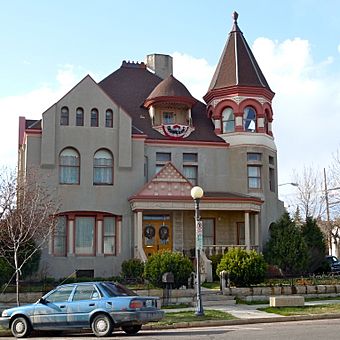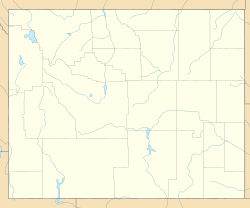Nagle Warren Mansion facts for kids
Quick facts for kids |
|
|
Nagle Warren Mansion
|
|

Nagle Warren Mansion in May 2011
|
|
| Location | 222 E. 17th St., Cheyenne, Wyoming |
|---|---|
| Built | 1888 |
| Architectural style | Romanesque |
| NRHP reference No. | 76001955 |
| Added to NRHP | July 12, 1976 |
The Nagle Warren Mansion is a historic building in Cheyenne, Wyoming. It was once a large family home. Later, it became a YWCA building. For many years, it operated as a special hotel called a bed and breakfast (B&B).
A B&B is a place where guests can rent a room for the night. It often includes breakfast in the morning. The Nagle Warren Mansion B&B had twelve guest rooms. These rooms were decorated in an old-fashioned style. They looked like homes from the American Old West. In 2019, the mansion became a private home again.
Contents
History of the Mansion
The Nagle Warren Mansion was built in 1888. A man named Erasmus Nagle had it built as his family home. Mr. Nagle passed away in 1890. His wife, Emma, and their son, George, continued to live there. They stayed in the mansion until 1907.
After 1907, Emma Nagle rented the house. A military leader named General George Randall lived there. He rented the mansion from 1907 to 1910.
Famous Owners and Guests
In April 1910, an important person bought the house. This was Francis E. Warren. He was a Senator for Wyoming. He had also been the Governor of Wyoming. Senator Warren and his second wife, Clara, moved into the mansion.
Their dining room hosted some very famous people. Two Presidents visited the mansion. These were Theodore Roosevelt and William Howard Taft. Imagine having a President visit your house!
Senator Warren died in 1929. His wife, Clara, then gave the mansion to the YWCA. The YWCA is an organization that helps young women.
Mansion's Unique Features
The Nagle Warren Mansion is special because it is one of the few old homes left in Cheyenne. It was built in the 1800s. The outside of the house was made of stone. People thought this stone might be too soft. In 1960, the stone began to crumble. So, the outside was covered with a material called stucco. This helped protect the building.
In 1985, Don and Barbara Sullivan bought the mansion. They lived there with their children. Later, in 1997, Jim Osterfoss bought the property. He worked to fix it up. He then turned it into the beautiful bed and breakfast it became.
Other Buildings on the Property
The property has more than just the main house. There is also a stone carriage house. This building was originally a stable for four horses. Later, it became a garage for cars. When the YWCA owned the property, it was used as an entertainment center.
An old stone smokehouse also still stands on the property. This means there are three buildings in total. The carriage house and the main house are now connected.
The Nagle Warren Mansion is an important historical site. It was added to the National Register of Historic Places on July 12, 1976. This means it is recognized as a place worth preserving.
 | William L. Dawson |
 | W. E. B. Du Bois |
 | Harry Belafonte |



